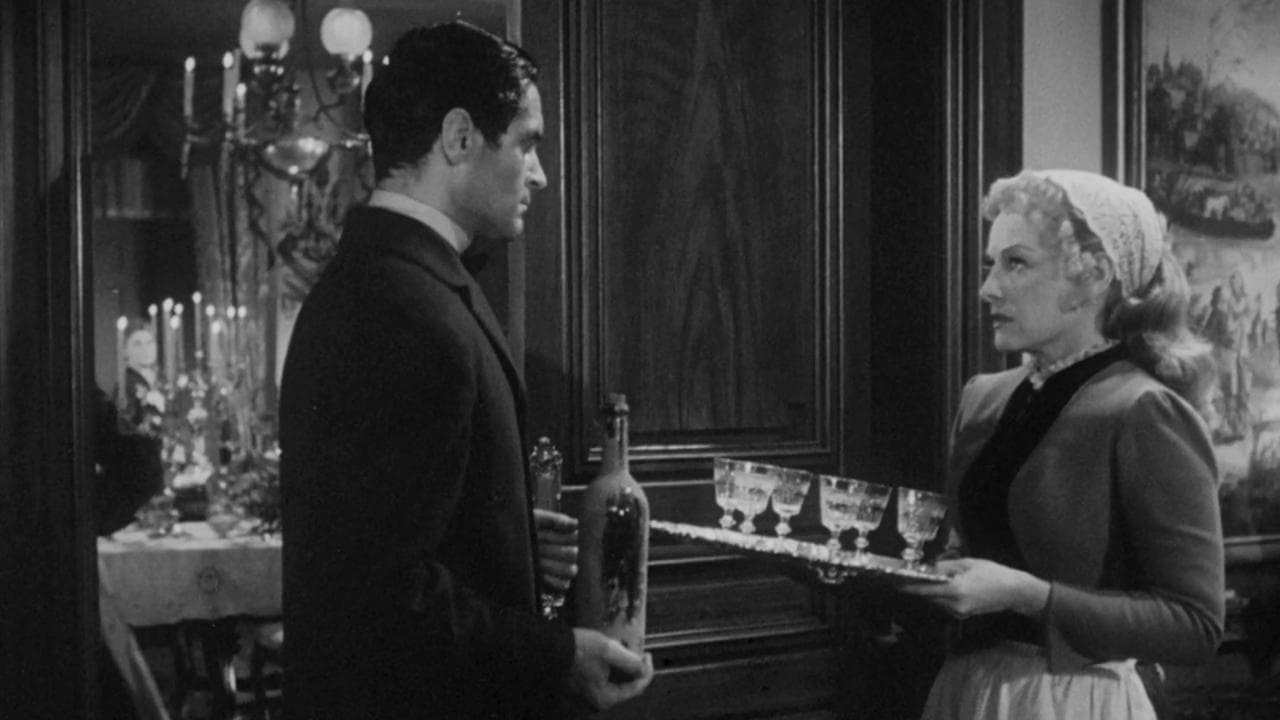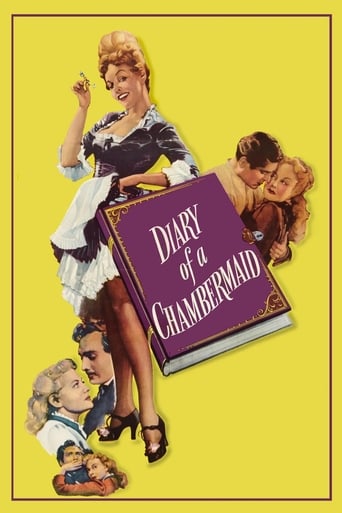Hellen
I like the storyline of this show,it attract me so much
NekoHomey
Purely Joyful Movie!
Teddie Blake
The movie turns out to be a little better than the average. Starting from a romantic formula often seen in the cinema, it ends in the most predictable (and somewhat bland) way.
Kien Navarro
Exactly the movie you think it is, but not the movie you want it to be.
James Hitchcock
"The Diary of a Chambermaid", based on the novel "Le Journal d'une Femme de Chambre" by Octave Mirbeau, is set in the France of the late 19th century. A young woman named Celestine arrives at the country home of the wealthy Monsieur and Madame Lanlaire to take up a position as a chambermaid. The attractive Celestine soon finds that she has three admirers: Georges, the handsome but sickly son of the family, their elderly and eccentric neighbour Captain Mauger, and Joseph, the taciturn stony-faced valet. (Joseph's duties seem more in line with those of a butler, but in the film he is always described as "the valet").I watched the film because it was directed by Jean Renoir, who has the reputation of being a heavyweight director, but actually it comes across as fairly frothy, lightweight stuff. Perhaps Renoir was asked to direct it because it was about his native country. I have never read Mirbeau's novel but from the film I suspect that his objective may have been to satirise the pretensions of the French Third Republic, which for all its talk of "égalité" was not in fact particularly egalitarian and remained as much a land of masters and servants as any other country in 19th century Europe. (Unlike the first two Republics, it did not come into being as the result of a revolution. It was originally intended as an interim government pending the restoration of the monarchy after the Franco-Prussian War, but became the permanent form of government by default when the politicians failed to agree on a candidate for the throne). These political considerations, however, were probably lost on an American audience in the forties; political satire can lose much of its point when it is set several decades in the past, especially in a foreign country.The film remains light and frothy even though two characters end up being killed. In both cases this seems like justifiable homicide, although in the first case this was probably not intended. The victim of this killing is Captain Mauger, played by Burgess Meredith as a manically hyperactive old fool, and the most irritating character in the film, a position for which there is considerable competition. Mauger's main challenger for this title is Irene Ryan's Louise, the family's other maid. It is said that there are some species of bat whose squeaks are too high-pitched for the human ear to hear, and Ryan's performance as the hysterically silly Louise shows that this can be true of people as well as bats.Paulette Goddard is today best remembered as the third Mrs Charlie Chaplin, although she was an important star in her own right during the forties. Here she is never as annoying as Meredith or Ryan, but even so she never really manages to make Celestine a sympathetic character. This, perhaps, is the fault of the scriptwriters rather than Goddard herself. Celestine is too coldly calculating and too willing to go along with Joseph's dishonest schemes, only abandoning him when she realises that Georges offers her better social prospects. This characterisation would not have mattered had the intention been to make the film as a satire, but it seems to have been intended more as a romantic comedy and does not really work as such. Probably the best performance comes from Francis Lederer as the saturnine villain Joseph.Mirbeau's story is a reasonably good one, and I could certainly imagine a good film being made from it, either as a comedy or as a drama. (I have never seen Luis Buñuel's version from the sixties). I gather than Renoir's film enjoyed a certain amount of success in 1946, but like a lot of comedies from the era it has not stood up well to the passage of time and today seems very dated. 4/10
Andres-Camara
It has a touch that seems like the actors are fooling around. Total, not seriously, that's all. Especially towards the end. At first it is fine but it is losing bellows and as is customary in Renoir, it mixes the genres in such a way that it does not make any sense.Spoiler:I do not know if it has ulterior motives although it seems to me that yes and I do not like anything, I speak of incest. It is clear that horns are spoken.The neighbor, is not that character unbearable? Always jumping.Why does Paulette want to go with Francis? That man is scary. He has not felt anything for him in the whole movie. For money? But he has the son and on top he gets along with him.The ending, it seemed a bad movie of laughter, could not believe that it had degenerated so much the film. I will not go into technical sections. Or I like none.In the end I did not know if they were laughing at me or what
Alex da Silva
Chambermaid Paulette Goddard (Celestine) and the feeble, irritating Irene Ryan (Louise) arrive at the stately home in which they are to serve. They first meet the rather unpleasant valet, Frances Lederer (Joseph) before being introduced to Reginald Owen (Captain Lanlaire) and his wife Judith Anderson (Madame Lanlaire), who have an ill son, Hurd Hatfield (George). It becomes clear that it is Goddard's role to make his life better. Can she succeed....? Paulette Goddard, Frances Lederer and Judith Anderson carry the film in terms of having a good cast but I'm afraid that's it. The film suffers by having too many buffoons - virtually everybody else. While Reginald Owen is OK as a bumbling old man, one is enough for any film. Unfortunately, we are also given Burgess Meredith as an extremely annoying old codger of a neighbour - he must be the most annoying character EVER. He constantly jumps and bounces around just like all old people do - you get my drift? He is so unconvincing that it's embarrassing. He is meant to be a likable, cheeky chappy. He isn't. Frances Lederer has a great moment with him towards the end of the film. Marvelous! Frances Lederer keeps the tension ticking and is very watchable as the valet with something sinister going on in his head. The plot is good and keeps us watching as to how things will pan out for Goddard. Time to check the silverware.
guil fisher
Almost a film noir movie, this dark film tells the story of Celestine, a young girl (Paulette Goddard) who comes to work for a well to do family. The parents (Reginald Owen and Judith Anderson) have a son (Hurd Hatfield) who seems to be too ill to care about life or love. Spice this with Celeste in the house and you can take it from there. Seems the Mama wants her to seduce her son and make him happy. Meanwhile, next door is a neighbor, Burgess Meredith, who is a bit looney yet lovable. He causes all sorts of raucus in his mischief and courts Celestine as well. However, along the way he is done in for his money by the butler of the house (Frances Lederer in a very spooky performance). Alls well that ends well and Hatfield gets his girl. What makes this film interesting, wonderfully directed by Jean Renoir, is the bleakness of the scenes. Darks and lights are used very effectively as are the costumes and Miss Goddard as a blonde was a good choice. This was a joint venture for Miss Goddard and Meredith (real husband and wife at the time) as producers.

